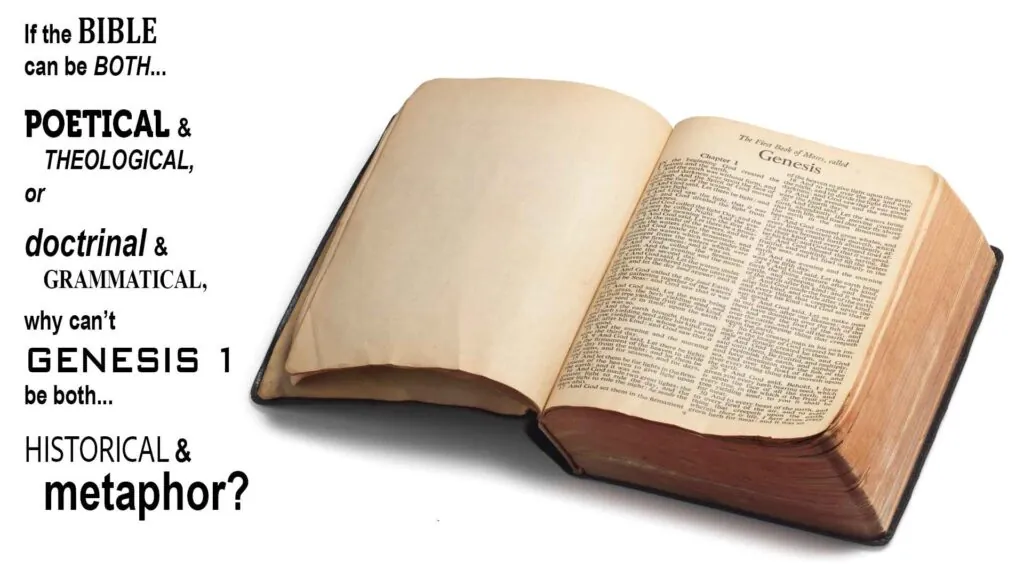Theistic evolution undermines God’s Truth, but it’s only continuing what Old Earth Creationism began
***
Christian philosopher J.P. Moreland has recently published an excellent article, “Theistic evolution, Christian Knowledge and Culture’s Plausibility Structure“, in the Journal of Biblical and Theological Studies (Volume 2, Issue 1:1-18, 2017). In it he reflects on the broader cultural implications of adopting theistic evolution as a means to integrate Christianity and science.
Knowledge and plausibility structures
Dr. Moreland notes that our Western society is highly empirical. Our culture presumes that valid knowledge can be acquired only through science (scientism), whereas non-empirical claims concerning values, ethics, spirits, and the like, are merely personal opinions (cultural relativism).
Today, the central issue is not whether Christianity is true, but whether it can be known to be true: Does Christianity have a valid source of knowledge? Knowledge is defined by Dr. Moreland as “true belief based on adequate grounds“. He contends:
The deepest issue facing the church today is this: Are its main creeds and central teachings items of knowledge or mere matters of blind faith–privatized personal beliefs or issues of feeling to be accepted or set aside according to the whim of individual or cultural pressures? Do these teachings have cognitive and behavioral authority that set a worldview framework for approaching science, art, ethics–indeed, all of life? Or are cognitive and behavioral authority set by what scientists, evolutionary biologists, or the members of BioLogos say? Are the church’s doctrines determined by what Gallup polls tell us is embraced by cultural and intellectual elites? Do we turn to these sources and set aside or revise two thousand years of Christian thinking and doctrinal/creedal expressions in order to make Christian teaching acceptable to the neuroscience department at UCLA or the paleontologists at Cambridge?
The question of whether or not Christianity provides its followers with a range of knowledge is no small matter. It is a question of authority for life and death, and lay brothers and sisters are watching Christian thinkers and leaders to see how we approach this matter. And, in my view, as theistic evolutionists continue to revise the Bible over and over again, they inexorably give off a message about knowledge: science gives us hard knowledge based on evidence and with which we can be confident, and while theology and biblical teaching do not give us knowledge, they provide personal meaning and values for those with the faith to embrace them.
Every culture, Dr. Moreland writes, has a plausibility structure – a set of background assumptions that determines what ideas people are willing to entertain as possibly true. Our current Western cultural plausibility structure elevates science, and bans Christianity from serious consideration. Such cultural bias makes effective evangelization difficult.
Theistic evolution as a gravedigger
Dr. Moreland contends that the acceptance of theistic evolution by many Christians has greatly contributed to the undermining of Christianity as a source of knowledge:
In my view, there are certain contemporary currents of thought that risk undercutting Christianity as a source of knowledge, and I shall argue that by its very nature, theistic evolution is the prime culprit. It is one of the church’s leading gravediggers…
The term “gravedigger” (from Os Guinness’s 1983 book The Gravedigger File) refers to Christians who, though well-intended, adopt views that eventually undermine the church.
Dr. Moreland raises three concerns:
- Theistic evolution reinforces scientism. It exemplifies the notion that, when science and the Bible clash, we revise the Bible, not science, since scientific truth claims exhibit solid knowledge based on facts.
- Such willingness to revise Biblical interpretations held for 2000 years implies that Biblical teaching is tentative.
- The most pervasive form of theistic evolution holds that God’s involvement in evolution is undetectable, so that it is in practice indistinguishable from naturalistic evolution. Most theistic evolutionists are opposed to Intelligent Design, the notion that God’s hand can readily be discerned in nature.
According to Dr. Moreland:
Theistic evolution is intellectual pacifism that lulls people to sleep while the barbarians are at the gates. In my experience, theistic evolutionists are usually trying to create a safe truce with science so Christians can be left alone to practice their privatized religion while retaining the respect of the dominant intellectual culture.
…Sometimes theistic evolutionists claim that by embracing evolution, they are actually contributing to the plausibility of Christianity by removing an unnecessary stumbling block – the rejection of evolution – before one can be a well-informed Christian. In my experience, nothing could be further from the truth. While there are exceptions, my experience with theistic evolutionists is that they have a weak faith, do not see many answers to prayer, and lack a vibrant, attractive Christian life. Ideas have consequences, and if one knows he had to revise the early chapters of Genesis, it will weaken his confidence in the rest of the Bible…After all, if we have to provide naturalistic revisions of the Bible over and over again, why take the yet-to-be-revised portions of scripture seriously? This approach significantly weakens the cognitive authority of the Bible as a source of knowledge of reality…
Given scientism, theistic evolution greases the skids towards placing non-scientific claims in a privatized upper story in which their factual, cognitive status is undermined…
Dr. Moreland expresses particular concern about the readiness of some Christian scholars to abandon belief in the historical reality of Adam and Eve. Given our culture’s current plausibility structure, this contributes to the marginalization of Christian teaching. He comments:
If I am right about the broader issues, then the rejection of an historical Adam and Eve has far more troubling implications than those that surface in trying to reinterpret certain biblical texts. The very status of biblical, theological and ethical teachings as knowledge is at stake in the current cultural milieu as is the church’s cognitive marginalization to a place outside the culture’s plausibility structure. Those who reject a historical Adam and Eve inadvertently harm the church by becoming its gravedigger.
Finally, Dr. Moreland notes that evolution entails that we are purely physical beings, and that an immaterial soul is no longer considered plausible within our modern culture. He deplores the fact that a number of Christian philosophers have adopted a physicalist view of humans.
Responding to cultural challenges
How should Christians respond to our culture, with its anti-Christian plausibility structure?
Dr. Moreland urges that we should not cave in to the prevailing contemporary currents of ideas. Instead, Christians should hold their ground, “eventually winning the argument due to hard-hitting scholarship and confidence in the Bible“:
Accordingly, it is of crucial importance that we promote the central teachings of Christianity in general as a body of knowledge and not as a set of faith-practices to be accepted on the basis of mere belief or a shared narrative alone. To fail at this point is to risk being marginalized and disregarded as those promoting a privatized set of feelings or desires that fall short of knowledge…
I want to win people to Christ and to “bring down strongholds” that undermine knowledge of God (2 Corinthians 10:3-5), to penetrate culture with a Christian worldview and to undermine its plausibility structure which, as things stand now, does not include objective theological claims.
He stresses the importance of apologetics, especially scientific apologetics, such as is done by the Intelligent Design movement (ID). The church should seek ways, such as a scientific critique of naturalist evolution, that may help to modify a person’s plausibility structure so as to create space in which Christianity can be seriously entertained.
How should conflicts with science be handled? Dr. Moreland advises that we should not be hasty to revise Scripture. Rather:
No, we should be patient, acknowledge the problem, and press into service Christian intellectuals who are highly qualified academically, have respect for the fact that scripture presents us with knowledge (not just truth to be accepted by blind faith), and who want to work to preserve the traditional interpretation of scripture and avoid revisionism. These intellectuals should be given the chance to develop rigorous models that preserve historical Christian teaching, unless, in those rare cases, our interpretation of scripture has been wrong. These intellectuals are heroes because they value loyalty to historic understandings of scripture over the desire to fit in with what scientists are currently claiming. The Intelligent Design movement is just such a set of intellectuals…
Rather than tucking their tails between their legs at the first sign of a conflict between the Bible and science, and standing ready (even eager) to let the scientists tell them what they must revise, the members of the ID movement have the intellectual courage and confidence in biblical teaching not to back down. Rather, ID advocates “deconstruct the pretentiousness” of truth-claims that go against biblical assertions that are properly interpreted (and they don’t grab for an interpretation that, all by itself, gives in to the other side of the conflict.) And they don’t make excuses for the Bible; they advance arguments in its support.
Digging deeper
There is much in this article that I can heartily endorse. I fully concur with Dr. Moreland that theistic evolutionists help dig the church’s grave by promoting modern culture’s plausibility structure, which has no place for Biblical knowledge. Allowing science to change our views on Adam and Eve is certainly a prime example of this danger. Further, it is commendable that the Intelligent Design movement exposes the weaknesses of naturalist evolution, and seeks to show that nature exhibits many marks of an Intelligent Designer.
Yet, in stressing scientific argumentation, and rarely referring to Scripture, the ID movement itself may be contributing to scientism. Moreover, many proponents of ID do not consistently exhibit great confidence in the Bible as a source of knowledge. For example, most of them – including Dr. Moreland – accept an ancient age for the earth, as given by mainstream geology. This obliges them to revise the traditional reading of Genesis 1-11, regarding such things as the creation days, the physical extent of Adam’s Fall, Noah’s Flood, the genealogies of Gen. 5 & 11, etc. For more discussion on this issue, see my article The Cost of an Old Earth: Is it Worth it?
Indeed, the plausibility structure reigning in most of Christian academia is such that it scorns those rare Christian academics who still promote traditional Biblical history.
Old Earth Creationism is subject to the same concerns that Dr. Moreland raises regarding theistic evolution, namely:
- It reinforces scientism. It exemplifies the notion that, when science and the Bible clash, we revise the Bible, not science, since scientific truth claims exhibit solid knowledge based on facts.
- Such willingness to revise Biblical interpretations held for 2000 years implies that Biblical teaching is tentative.
Moreover, the Biblical Adam, though an essential part of traditional Biblical history, becomes blatantly implausible when thrust into the setting of mainstream geology and paleontology, which traces modern humans back at least 300,000 years, with much earlier ancestors, exhibiting suffering and death from the beginning, etc.
Consequently, a plausibility structure that includes mainstream geology, and correspondingly downplays Biblical ancient history, paves the way for plausibility structures that exclude further Biblical teachings, such as the historical Adam.
I have a high regard for Dr. Moreland. He has written much worthwhile material, and made important contributions to Christian scholarship. Nevertheless, I believe that he has been inconsistent in upholding his own standards, thereby inadvertently contributing to grave-digging. Theistic evolutionists are merely deepening the grave already substantially dug by Old Earth creationists.
In his article Dr. Moreland cautions:
It should be clear that naturalism is not consistent with biblical Christianity. If that’s true, then the church should do all it can to undermine the worldview of naturalism and to promote, among other things, the cognitive, alethic nature of theology, biblical teaching and ethics. This means that when Christians consider adopting certain views widely accepted in the culture, they must factor into their consideration whether or not such adoption would enhance naturalism’s hegemony and help dig the church’s own grave by contributing to a hostile, undermining plausibility structure.
Wise advice! Perhaps Dr. Moreland should heed it by reconsidering his own plausibility structure.
This article first appeared in an Oct. 24, 2009 post on Dr. John Byl’s blog Bylogos.blogspot.com and is reprinted here with permission. Dr. John Byl is a Professor emeritus for Trinity Western University, and the author of “God and Cosmos: A Christian View of Time, Space, and the Universe” and “The Divine Challenge: On Matter, Mind, Math & Meaning.”











